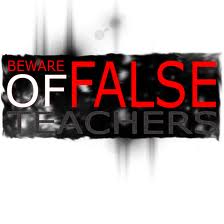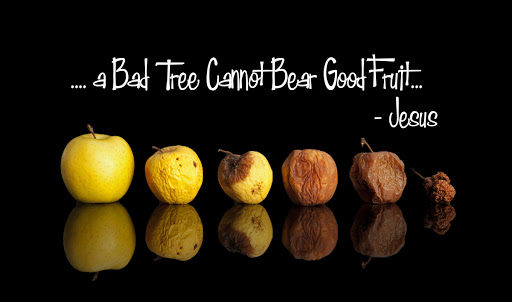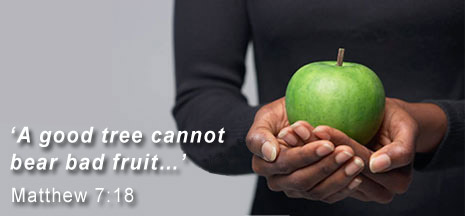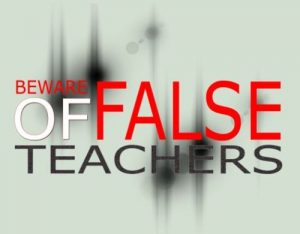In Matthew 12:33-37, in the context of warning the religious leaders about the sin of blasphemy against the Holy Spirit, Jesus talks about good fruit and bad fruit. Is Jesus telling people to look at the lives of other teachers to see if they have good works? No! Not at all. Listen to the study to see what Jesus IS teaching and why this is important for properly understanding the gospel.
This study is an excerpt from my Gospel Dictionary online course. This course considers 52 key words of the Gospel and thousands of biblical texts. The course contains over 100 hours Bible teaching. You can take the course by joining my online discipleship group.
What is the “fruit” in Matthew 12:33-37 (Luke 6:43-45)?
Either make the tree good and its fruit good, or else make the tree bad and its fruit bad; for a tree is known by its fruit. Brood of vipers! How can you, being evil, speak good things? For out of the abundance of the heart the mouth speaks. A good man out of the good treasure of his heart brings forth good things, and an evil man out of the evil treasure brings forth evil things. But I say to you that for every idle word men may speak, they will give account of it in the day of judgment. For by your words you will be justified, and by your words you will be condemned (Matthew 12:33-37)
 Matthew 12:33-37 (and the parallel passage in Luke 6:43-45) is a key passage for understanding the symbolic use of fruit in Scripture.
Matthew 12:33-37 (and the parallel passage in Luke 6:43-45) is a key passage for understanding the symbolic use of fruit in Scripture.
The context makes it explicitly clear that the fruit which comes from a person is not the works their life produces, but rather the words that proceed from their mouth. After Jesus says that “a tree is known by its fruit,” He states that the words of a person reveal what is in the heart. In this context, it is extremely clear that the good fruit of a person’s life are the good words that proceed out of their mouth. If these words agree with the rest of Scripture, they are good words, and therefore, good fruit.
Matthew 12:33-37 Primarily has Bible Teachers in View
It is important to point out that all of the teaching in Scripture about the good fruit of good words primarily have Bible and theology teachers in view.
Most of the passages that invite us to look to the words a person says as an indication of whether they should be listened to or not, only have in view the words they say about Scripture and theology, and even then, primarily to professional teachers.

The biblical teaching about good fruit does not apply to the views a person might have about politics, science, current events, or history. If a person has some nutty views about such things, while we might be wise to ignore their ideas, the biblical teachings about good and bad fruit do not apply to such cases. The biblical teachings about good and bad fruit only apply to people who are teaching Scripture and theology.
We can go a bit further as well.
 The biblical teachings about good and bad fruit don’t even apply to the average person who is generally uniformed or uneducated about what the Bible teaches. Instead, the warnings from Scripture about good and bad fruit primarily apply to those whose job it is to teach others about Scripture and theology.
The biblical teachings about good and bad fruit don’t even apply to the average person who is generally uniformed or uneducated about what the Bible teaches. Instead, the warnings from Scripture about good and bad fruit primarily apply to those whose job it is to teach others about Scripture and theology.
In the days of Jesus, it was the religious leaders, the Sadducees, Pharisees, and scribes. Today it would be the pastors, theologians, and seminary professors. These are the ones whose teachings we must carefully analyze to see whether or not their words align with the overall teaching of Scripture.
In regards to their teachings, we are to be noble Bereans, and search the Scriptures to see whether or not what they say is true (Acts 17:11).
Good Fruit is Not about Good Works
One thing we are not invited to do is look at a person’s works.
The Bible reveals that if you want to know whether or not a person is a false teacher, all you need to do is listen to what they say and compare it with the teaching of Scripture.
After all, when it comes to false teachers, actions can be deceptive, but their teachings will rarely lie. It is as Paul writes in 2 Corinthians 11:13-14 that false apostles can appear as apostles of Christ and even Satan is transformed into an angel of light. That is exactly what we see here in Matthew 12:33-37.
But what about the Unforgivable Sin?
It is significant that in the immediately preceding context, the Jewish religious leaders had accused Jesus of casting out demons by Beelzebub (Matt 12:24). In response, Jesus warns them about speaking blasphemy against the Spirit (Matt 12:31-32).
(#AmazonAdLink)  This does not mean that they had spoken blasphemy against the Spirit; only that they were about to. As I explain in my book (#AmazonAdLink) Why You Have Not Committed the Unforgivable Sin, there is no passage in Scripture which clearly tells us what blasphemy against the Spirit is. Though the sin is related to speaking words against the Holy Spirit (cf. Luke 12:10), no passage clearly states what these words are that should not be spoken. It is probably not specific words anyway, but more of general attitude of the heart that is revealed through one’s words.
This does not mean that they had spoken blasphemy against the Spirit; only that they were about to. As I explain in my book (#AmazonAdLink) Why You Have Not Committed the Unforgivable Sin, there is no passage in Scripture which clearly tells us what blasphemy against the Spirit is. Though the sin is related to speaking words against the Holy Spirit (cf. Luke 12:10), no passage clearly states what these words are that should not be spoken. It is probably not specific words anyway, but more of general attitude of the heart that is revealed through one’s words.
Nevertheless, although the Bible doesn’t say precisely identify the nature of this particular sin, many pastors and teachers claim to know what this sin is and they use their teachings to create fear in the minds of others by warning them against committing it. Such pastors and teachers should be ignored and avoided, for they are speaking where Scripture has not. Such teachers are close to doing the same thing as the Pharisees in this passage, and it is toward them that Jesus directs the warning about blasphemy!
Matthew 12:33-37 and Good Fruit
This entire context reveals the truth of Jesus’ teaching about fruit.
By verbally challenging the words and teachings of Jesus, the Pharisees revealed the fruit of their heart, showing all that they were bad trees who produce bad fruit, and therefore should not be heeded, listened to, or obeyed. Though by all outward appearances, the Pharisees were the most observant and scrupulous keepers of the Mosaic Law, their accusatory words revealed the true condition of their hearts.
Note, however, that once again, nothing is said in this context about being able to discern the eternal destiny of others. Even when someone speaks falsely, while their words may mark them as a false teacher, this does not mean they are eternally condemned. It is possible that they have eternal life, but are simply confused or deceived themselves.
Though bad fruit from the lips reveals that a bad tree has taken root in the heart, bad fruit reveals nothing one way or the other about whether or not a person has eternal life.
 Understanding the Gospel requires us to properly understand the key words and terms of the Gospel. Take my course, "The Gospel Dictionary" to learn about the 52 key words of the Gospel, and hundreds of Bible passages that use these words.
Understanding the Gospel requires us to properly understand the key words and terms of the Gospel. Take my course, "The Gospel Dictionary" to learn about the 52 key words of the Gospel, and hundreds of Bible passages that use these words.
This course costs $297, but when you join the Discipleship group, you can to take the entire course for free.






 It is important to note that this passage, like many of the others about fruit, applies only to prophets and teachers. Jesus is not giving a blanket statement here about judging the average person.
It is important to note that this passage, like many of the others about fruit, applies only to prophets and teachers. Jesus is not giving a blanket statement here about judging the average person. So neither the reference to fire nor the reference to the kingdom of God have anything to do with eternal destiny, but everything to do with what we experience now in the life based on what sort of teachings we hear and whether or not we follow such teachings.
So neither the reference to fire nor the reference to the kingdom of God have anything to do with eternal destiny, but everything to do with what we experience now in the life based on what sort of teachings we hear and whether or not we follow such teachings.